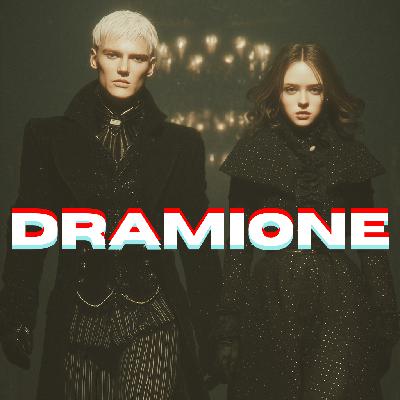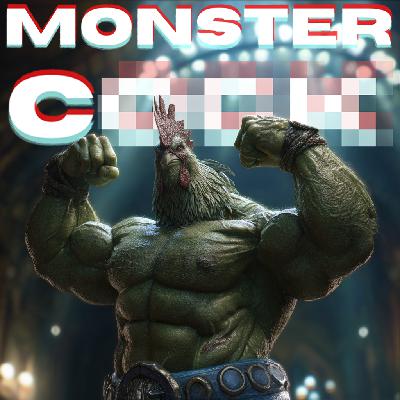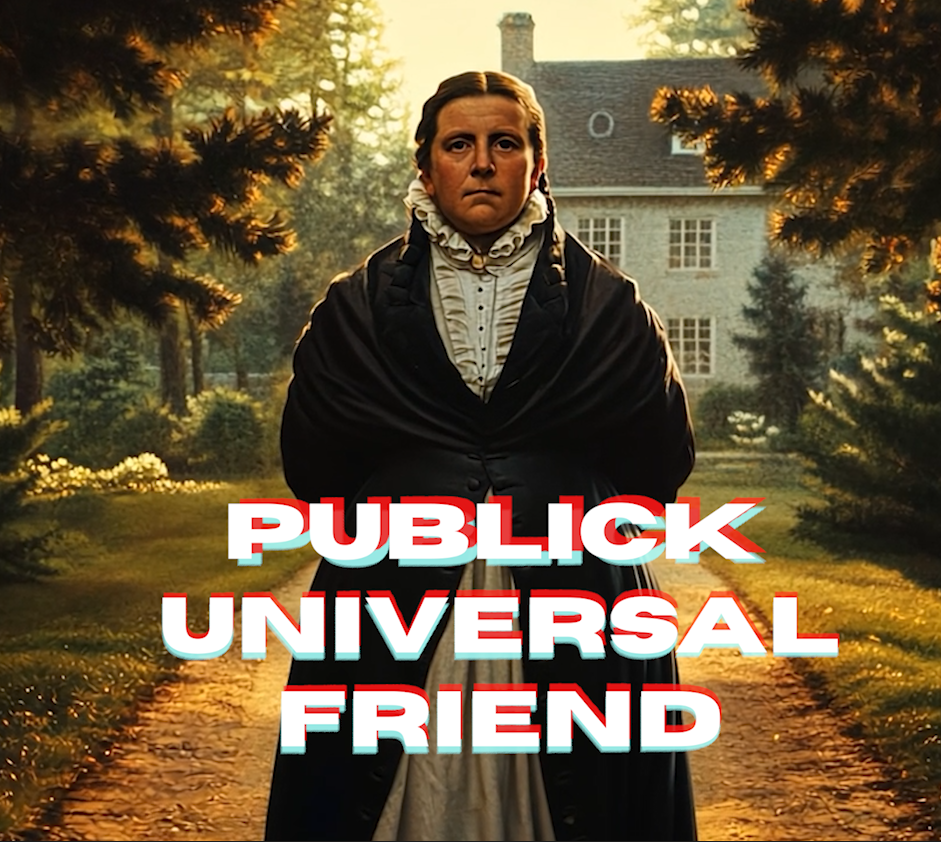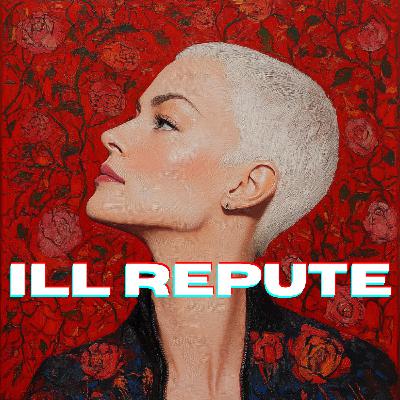Discover ILL REPUTE! with Jasmine Lee Keith
ILL REPUTE! with Jasmine Lee Keith

ILL REPUTE! with Jasmine Lee Keith
Author: Sovereign Syre and Joshua Anderson
Subscribed: 160Played: 3,112Subscribe
Share
© Sovereign Syre & Joshua Anderson
Description
Writer and comedian Jasmine Lee Keith, formerly known as Sovereign Syre chronicles the lives of difficult and dangerous women throughout history as well as diving into issues related to women and womanhood in all it's forms. Trans-inclusive. Not Safe For Work. We here at ILL REPUTE! support women's rights, but more importantly we support women's wrongs.
118 Episodes
Reverse
We continue our discussion about the publishing journey of what Manacled turned into: Alchemized. One of the hottest book releases of the year, the film rights were quickly bought, further legitimizing converted fanfiction and the audiences insatiable appetite for it. We also discuss wether it stands on its own without references to HP, if the tone and setting are given enough substance, and the double edged sword for writing for an audience.
This weeks episode continues our series on self publishing, fan fiction, romantasy, and booktok as we delve in the controversy around the sale and marketing of pull to publish fan fiction. First with a brief introduction to the history of fan fiction and its culture, followed with a discussion of the extreme popularity of Harry Potter slash fiction, with die hard fans particular obsession of the non canon pairing of Draco and Hermione A.K.A DraMione. Buy Jasmine's first novel, Above Snakes https://www.amazon.com/Above-Snakes-Jasmine-Lee-Keith-ebook/dp/B0FL1J2JYK https://www.sovereignsyre.net/
In this episode Jasmine discusses the recent controversy around up and coming author Audra Winter, and her years long marketing campaign for her debut novel The Age or Scorpius, it's diasterous release, the ensuing fallout, and the way Tiktok has changed how commercial fiction is marketed and sold. Jasmine also explains her personal writing process a llittle bit. We also discuss ABOVE SNAKES her debut novel, a dark western historical romance AVAILABLE NOW on Amazon (https://www.amazon.com/Above-Snakes-Jasmine-Lee-Keith/dp/B0FL3667BZ/) and https://www.sovereignsyre.net/books
WELCOME BACK EVERYONE, MY GOD WE'VE MISSED YOU SO UNBELIEVABLY MUCH!!! And WOW!! What a crazy episode this turned out to be. We just get straight to it, Sov has a lot of changes to announce, including the upcoming release of her first book, Which we are all incredibly excited about. This weeks episode is VERY SPICY! BE FOREWARNED, DO NOT LISTEN TO THIS AROUND YOUR KIDS OR PARENTS OR ANYWHERE IN PUBLIC. We talk very explicitly about history of erotic fiction, as it pertains to depictions of monsters inflagrante delecto (AKA doing sex.) From ancient Greek mythology, all the way up to World of Warcraft. ANNND, As a special treat, if you stay to the end, you can hear Josh read the first chapter from Sov's upcoming novel, Above Snakes!
Welp... looks like were in the prologue of a YA dystopian novel. Hope our protag has the pluck and gumption to tackle this one, cuz we're running out of ideas!
Hope you and your loved ones are safe and well! We talk about the LA wildires and its potential impact of the future of LA, delve into a little bit about how disaster's can drive policy, and touch on the (maybe) the final days of Tiktok. Donation link for the victims of the LA wildfires: https://lacity.gov/LAstrong
Look at us! Just a couple of Nostradamus's over here. Sov and Josh ponder the kind of inaguration you could throw for 5Million. We also brace for impact with our mouths full of sour grapes. Who's know for sure, but we can all agree this year is going to be a wild one!
So long 2024, don't let the door hit ya where the good lord split ya! As we say good bye to 2024, we can't help but drag the upcoming administration one last time. If 2024 is any indication, 2025 is gonna be a wild one! Love you guys and thank you so much for sticking around through our first full year, it's been really great connecting with those of you who generously spend your time with us. Great things are coming, SEE YOU NEXT YEAR!
Happy Holidays! We do a little year in review, nothing too heavy ;) Love you guys, thanks for sticking with us!
This week we give some pipin' hot takes (or lets face it, mostly just pretty lukewarm ones) Other than that this ones pretty chill, actually. We also talk about what the heck is going on the podcast for the next few months. illreputepodcast.com
This week: Sovereign shares some of her new bits that she's working on, Josh has some questions about vaginas, and then it sort of devolves into speculating about the upcoming class war. BOOK US FOR YOUR NEXT PARTY!
This week Sov and Becky talk about the origins of Wonder Woman. Support Us: http://patreon.com/illrepute About Us: http://illreputepodcast.com Credits: Hosted by Sovereign Syre and Becky Poole Compiled by Sovereign Syre Produced by Joshua Anderson Works Cited: Daniels, Les. Wonder Woman: The Complete History. Chronicle Books, 2000. A comprehensive history of Wonder Woman, exploring her creation, evolution, and cultural impact. Lepore, Jill. The Secret History of Wonder Woman. Alfred A. Knopf, 2014. A detailed biography of Wonder Woman's creator, William Moulton Marston, and the feminist roots of the character. Marston, William Moulton. "Why 100,000,000 Americans Read Comics." The American Scholar, vol. 13, no. 1, 1943, pp. 35-44. Marston's own essay on the psychological appeal of comics and the creation of Wonder Woman. All Star Comics #8. DC Comics, 1941. Wonder Woman's debut issue, written by William Moulton Marston and illustrated by Harry G. Peter. Sensation Comics #1. DC Comics, 1942. Wonder Woman's first solo story, where her mission and character are further developed. Wertham, Fredric. Seduction of the Innocent. Rinehart & Company, 1954. A critique of comics' influence on youth, with specific references to Wonder Woman and her themes. "The Feminum Mystique." Wonder Woman (1975 TV series), season 1, episodes 1-2. Directed by Richard A. Colla, Warner Bros. Television. An exploration of Wonder Woman's Amazonian roots in the TV series. Jenkins, Patty, director. Wonder Woman. Warner Bros. Pictures, 2017. The first Wonder Woman feature film, showcasing her origin and mission in a modern cinematic context. Jenkins, Patty, director. Wonder Woman 1984. Warner Bros. Pictures, 2020. The sequel to the 2017 film, exploring themes of power, greed, and humanity. Steinem, Gloria. "Wonder Woman." Ms. Magazine, vol. 1, no. 1, 1972. An article celebrating Wonder Woman as a feminist icon, reclaiming her place in the cultural zeitgeist. Lichtenstein, Roy. Crying Girl. 1963. A pop art painting reflecting comic book aesthetics, influenced by Wonder Woman's visual style. Carter, Lynda. "Lynda Carter Reflects on Wonder Woman's Legacy." The Hollywood Reporter, June 2, 2017. An interview with Carter about her portrayal of Wonder Woman and the cultural significance of the character. Hanley, Tim. Wonder Woman Unbound: The Curious History of the World's Most Famous Heroine. Chicago Review Press, 2014. An analysis of Wonder Woman's evolution and the societal forces that shaped her stories. "No Man's Land Scene Explained by Patty Jenkins." Entertainment Weekly, July 10, 2017. A discussion of the iconic scene in Wonder Woman (2017) and its impact. Dworkin, Andrea. Right-Wing Women. Perigee Books, 1983. A feminist critique that includes commentary on female representations in media, including Wonder Woman.
This weeks Itty Bitty Repute Committee: Joe Biden: Great President, terrible Father or is it the other way around? The left's addiction to moralizing all interpersonal conflict, and we lament the passing of Hard Rock Nick
Jemima was born on November 29, 1752, in Cumberland, Rhode Island, She was the eighth of twelve children in a big, devout Quaker family. Her dad, Jeremiah Wilkinson, was super active in their local meeting house. Her mom, Amy's presence in Jemima's life was cut tragically short—she died in 1764 when Jemima was about 12 or 13. According to accounts, Jemima was always a pretty girl, but after her mother passed away, she became lazy and combative. She would find anyway she could to get out of working, she would feign illnesses, argue and so on. She was just generally considered pretty but kind of mean and very entitled. Then at some point in 1776, she starts acting sick, she stays in her room and won't talk to anyone. Her family calls the doctor, who says she's not physically ill, but clearly has mental issues. This goes on for months, until she confines herself to her bed. While later accounts say she had typhus, contemporary accounts say there was never a physical illness. But one day she emerged from her bedroom, talking in a deeper voice, and proclaiming: That Jemima Wilkinson was dead. Their soul had left their body, and in its place was a new entity: the Publick Universal Friend, a genderless spirit sent by God to deliver a divine message to humanity. Visit us: Illreputepodcast.com support us: Parteon.com/illrepute Script by: Soveriegn Syre this weeks episode hosted by: Sovereign Syre and Josh Anderson Produced by: Josh Anderson Sources: Hudson, David. Memoir of Jemima Wilkinson: A Preacheress of the Eighteenth Century. London: Baldwin, Cradock, and Joy, 1821. A detailed early biography of Jemima Wilkinson, focusing on their transformation and the Society of Universal Friends. Wisbey, Herbert A., Jr. Pioneer Prophetess: Jemima Wilkinson, the Publick Universal Friend. Cornell University Press, 1964. A comprehensive modern analysis of the Friend's life, teachings, and the community they founded. Brekus, Catherine A. Strangers and Pilgrims: Female Preaching in America, 1740–1845. University of North Carolina Press, 1998. Context on female religious leaders in early America and the challenges they faced. Schmidt, Leigh Eric. Hearing Things: Religion, Illusion, and the American Enlightenment. Harvard University Press, 2000. Examines religious movements like the Society of Universal Friends in the context of broader spiritual trends in 18th-century America. Butler, Jon. Awash in a Sea of Faith: Christianizing the American People. Harvard University Press, 1990. Provides context on religious diversity and dissent in colonial America. "Publick Universal Friend." Wikipedia. Accessed [Insert Date]. Overview of the Friend's life, teachings, and the Society of Universal Friends. Foster, Lawrence. Religion and Sexuality: The Shakers, the Mormons, and the Oneida Community. University of Illinois Press, 1984. Comparative analysis of celibate religious communities, including the Society of Universal Friends. Newspapers.com Quaker Faith and Practice. Religious Society of Friends (Quakers). A source for understanding Quaker principles and their influence on the Friend's early life.
This week we are talking turkey about turkeyday, or tofurkey depending on your preference. Sov and Josh reveal how they are connected, discuss some strange Thanksgiving facts, speculate that Thanksgiving and Halloween as we know it now, may have actually started out as one thing, and also discuss how grateful we are to have all of you amazing listeners! HAPPY THANKSGIVING EVERYONE!! Hosted by Sovereign Syre and Josh Anderson Produced by Josh Anderson support us: illreputepodcast.com NPR Article "When Thanksgiving was weird" https://www.npr.org/sections/theprotojournalist/2014/11/19/365195079/when-thanksgiving-was-weird
This week Sovereign Syre and Becky Poole talk about the most controversial fitness influencer of her time...Susan Powter! Support Us: http://patreong.com/illrepute More Info: http://illreputepodcast.com Sources: Books: Powter, Susan. "Stop the Insanity!" Simon & Schuster, 1993 Powter, Susan. "The Politics of Stupid: The Cure for Obesity." Simon & Schuster, 2002 Articles: Powell, Meghan. "90s Fitness Icon Susan Powter Disappeared From Public Life After Mortifying Hollywood Experience." Fox News, 2024 Smith, Dinitia. "Susan Powter: It's Not All About Losing Weight." The New York Times, 1994 "Jamie Lee Curtis to Produce Documentary on Susan Powter's Life and Legacy." Entertainment Weekly, 2024 Poole, Sheila. "Susan Powter: The Fitness Guru's Journey from Fame to Advocacy." Atlanta Journal-Constitution, 2007 Liverampup Staff. "Susan Powter's Life After Coming Out as Lesbian." Liverampup.com, 2024 Video Sources: "Stop the Insanity!" Infomercial, 1992 "The Susan Powter Show," Syndicated, 1994-1995
On a very serious Little Repute this week: Sov refuses to speak on America's Voldemort, Josh violently ponder's wtf if anything the current administration actually cares about, other than sitting THE THRONE. They both go a little hard on Elon (but we're sure he'll be just fine.) Sovereign makes a despereate plea for some exposure therapy in the hopes of overcoming her fear of the CyberTruck
This week we have a new friend joining us to cohost, Becky Poole. Originally from Minnesota, Becky is a very funny and talented, comedianne, improv actor, musician, and podcaster in her own right, as well as being just overall rad! She joins Sov as they profile and discuss the much maligned voting block of white american women who can't seem to let go of their narcissist billionaire boyfriend fantasy. They have a lot of ground to cover, and being white women themselves, do tiny bit soul searching to figure out what the heck is going ladies?! support us: illreputepodcast.com Hosted by: Sovereign Syre and Becky Poole script by: Sovereign Syre Produced and Edited by: Josh Anderson Works Cited Baldwin, James. Blues for Mister Charlie. 1964. A play exploring racial injustice, drawing on the term "Mister Charlie" as a representation of systemic oppression. Reynolds, Malvina. It Isn't Nice. 1967. A protest song highlighting social justice themes, including references to "Mister Charlie." Hurston, Zora Neale. Glossary of Harlem Slang. A key text documenting African American vernacular, including terms like "Miss Ann." Angelou, Maya. Sepia Fashion Show. A poem addressing cultural and racial dynamics, mentioning "Miss Ann." Cassell, Jonathon. Cassell's Dictionary of Slang. 2005. Provides historical context for terms like "Mister Charlie" and "Miss Ann." Smitherman, Geneva. Black Talk: Words and Phrases from the Hood to the Amen Corner. 1994. Explores African American vernacular, including the cultural significance of "Miss Ann." Davis, Angela Y. Women, Race, and Class. 1981. A foundational text discussing white women's roles in systemic oppression and feminism's historical limitations. Cooper, Brittney. Eloquent Rage: A Black Feminist Discovers Her Superpower. 2018. Discusses white women's complicity in upholding white supremacy through feminism. Alexander, Michelle. The New Jim Crow: Mass Incarceration in the Age of Colorblindness. 2010. Examines systemic racism and how it intersects with social narratives around "law and order." Hochschild, Arlie Russell. Strangers in Their Own Land: Anger and Mourning on the American Right. 2016. Investigates the cultural and economic concerns driving conservative ideologies among white working-class communities. Du Bois, W.E.B. Black Reconstruction in America. 1935. Explores the roles of white women during Reconstruction and their complicity in maintaining racial hierarchies. Phillips, Anne. Gender and Culture. 2010. Analyzes the intersections of gender, race, and cultural expectations. Media and Current Events: Coverage of incidents like the Central Park birdwatching case (2020) and Emmett Till's murder (1955) to contextualize the "Karen" archetype. Pew Research Center. Political Polarization in the American Public. 2014. Explores voting patterns and political alignment among demographic groups, including white women. Kendzior, Sarah. The View from Flyover Country: Dispatches from the Forgotten America. 2018. Provides insights into rural and working-class dynamics that inform voting behaviors. Crenshaw, Kimberlé. Mapping the Margins: Intersectionality, Identity Politics, and Violence Against Women of Color. 1991. Introduces the concept of intersectionality and its importance in understanding diverse experiences. Lorde, Audre. Sister Outsider: Essays and Speeches. 1984. Critiques the centering of white women in feminist movements and the importance of inclusive activism.
This weeks minisode: More armchair quarterbacking of the 2024 election; the left collectively moving into our mothers' basements, putting on our tinfoil hats, and embracing our inner delusional conspiracist; finally, how long will the bromance between these two dashing, billionaire, good time party bois last?
Today we are talking about the one and only, Florence "Flo-Jo" Joyner, the woman who redefined speed, style, and success on the track. We're diving into the life of one of the most iconic athletes of the 20th century. Not just because of her breathtaking world records—still unbeaten decades later—but because of the way she lived. Flo-Jo wasn't just a champion on the track; she was a force of nature in fashion, an icon for Black women, and a cultural trailblazer who challenged the expectations placed on women in sports. Support Us: http://patreon.com/illrepute Credits: Compiled by Sovereign Syre Hosted by Sovereign Syre and Josh Anderson Produced by Joshua Anderson Works Cited "Florence Griffith Joyner." Encyclopaedia Britannica. Encyclopaedia Britannica, Inc. https://www.britannica.com/biography/Florence-Griffith-Joyner This source provides a comprehensive biography of Florence Joyner, covering her early life, Olympic success, and post-Olympic career. "The Untold Story of Flo Jo, the Fastest Woman of All Time." Olympics.com. International Olympic Committee. https://olympics.com/en/news/florence-griffith-joyner-flo-jo-world-records A detailed look into Florence Joyner's world records and the lasting impact of her Olympic achievements. Schmidt, Michael S. "Florence Griffith Joyner, 38, Champion Sprinter, Is Dead." The New York Times, September 22, 1998. https://www.nytimes.com/1998/09/22/sports/florence-griffith-joyner-38-champion-sprinter-is-dead.html An obituary that reflects on her life, her legacy, and the controversies surrounding her sudden death. "Sha'Carri Richardson and the Legacy of Flo-Jo." The New Yorker, July 2021. https://www.newyorker.com/sports/sha-carri-richardson-flo-jo This article draws parallels between Sha'Carri Richardson and Florence Joyner, focusing on how both athletes used fashion and self-expression as part of their identities in a highly scrutinized public arena. "Double Standard: How the Media Treated Tonya Harding and Nancy Kerrigan Differently." The Atlantic. January 2018. https://www.theatlantic.com/entertainment/archive/2018/01/tonya-harding-nancy-kerrigan/549722/ This article discusses the media's contrasting portrayals of Tonya Harding and Nancy Kerrigan, focusing on the class and femininity narratives used to criticize Harding. "Serena Williams's Legacy and the Body Politic." The Guardian, September 2018. https://www.theguardian.com/sport/serena-williams-legacy-body-politic This piece highlights the racial and gendered criticisms Serena Williams has faced throughout her career, drawing connections to similar challenges faced by athletes like Florence Joyner. Duncan, Margaret Carlisle. "The Media Coverage of Women's Sport: Beyond Sexualization, Gender Stereotyping, and Misrepresentation." Sociology of Sport Journal. 2012. This academic article discusses the media's portrayal of female athletes, including critiques of femininity, strength, and how athletes like Florence Joyner, Serena Williams, and Tonya Harding have been framed in public discourse. "The 1980 U.S. Olympic Boycott." History.com. A&E Television Networks. https://www.history.com/topics/cold-war/1980-us-olympic-boycott Background on the 1980 U.S. Olympic boycott and its impact on athletes like Florence Joyner who missed out on that opportunity. "Florence Griffith Joyner: Nails, Speed, and Style." Track and Field News. https://trackandfieldnews.com/florence-griffith-joyner A profile of Florence Joyner that emphasizes her unique style and how she used fashion as part of her identity as an athlete.















❤️